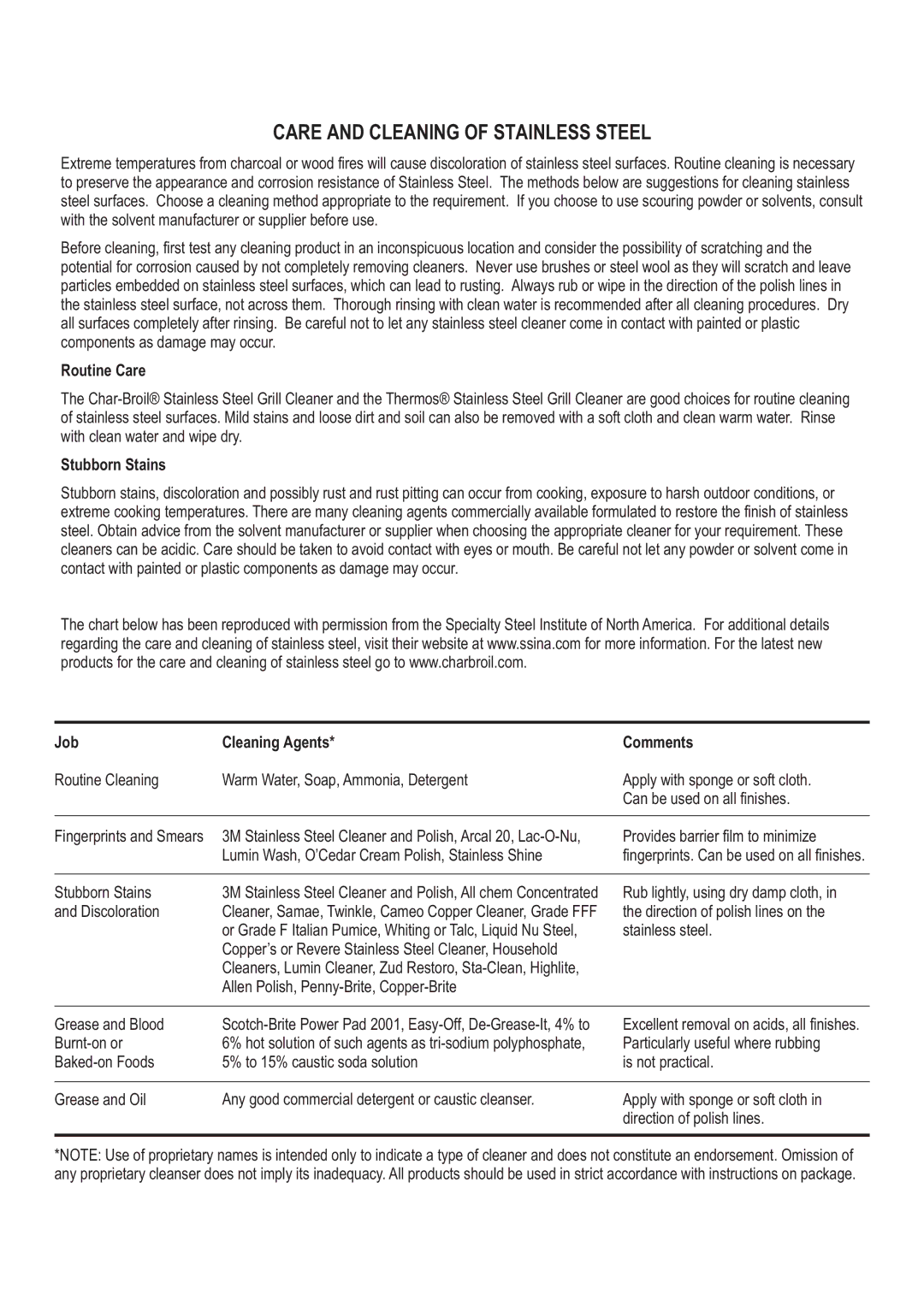
CARE AND CLEANING OF STAINLESS STEEL
Extreme temperatures from charcoal or wood fires will cause discoloration of stainless steel surfaces. Routine cleaning is necessary to preserve the appearance and corrosion resistance of Stainless Steel. The methods below are suggestions for cleaning stainless steel surfaces. Choose a cleaning method appropriate to the requirement. If you choose to use scouring powder or solvents, consult with the solvent manufacturer or supplier before use.
Before cleaning, first test any cleaning product in an inconspicuous location and consider the possibility of scratching and the potential for corrosion caused by not completely removing cleaners. Never use brushes or steel wool as they will scratch and leave particles embedded on stainless steel surfaces, which can lead to rusting. Always rub or wipe in the direction of the polish lines in the stainless steel surface, not across them. Thorough rinsing with clean water is recommended after all cleaning procedures. Dry all surfaces completely after rinsing. Be careful not to let any stainless steel cleaner come in contact with painted or plastic components as damage may occur.
Routine Care
The
Stubborn Stains
Stubborn stains, discoloration and possibly rust and rust pitting can occur from cooking, exposure to harsh outdoor conditions, or extreme cooking temperatures. There are many cleaning agents commercially available formulated to restore the finish of stainless steel. Obtain advice from the solvent manufacturer or supplier when choosing the appropriate cleaner for your requirement. These cleaners can be acidic. Care should be taken to avoid contact with eyes or mouth. Be careful not let any powder or solvent come in contact with painted or plastic components as damage may occur.
The chart below has been reproduced with permission from the Specialty Steel Institute of North America. For additional details regarding the care and cleaning of stainless steel, visit their website at www.ssina.com for more information. For the latest new products for the care and cleaning of stainless steel go to www.charbroil.com.
Job | Cleaning Agents* | Comments |
Routine Cleaning | Warm Water, Soap, Ammonia, Detergent | Apply with sponge or soft cloth. |
|
| Can be used on all finishes. |
|
|
|
Fingerprints and Smears | 3M Stainless Steel Cleaner and Polish, Arcal 20, | Provides barrier film to minimize |
| Lumin Wash, O’Cedar Cream Polish, Stainless Shine | fingerprints. Can be used on all finishes. |
Stubborn Stains | 3M Stainless Steel Cleaner and Polish, All chem Concentrated |
and Discoloration | Cleaner, Samae, Twinkle, Cameo Copper Cleaner, Grade FFF |
| or Grade F Italian Pumice, Whiting or Talc, Liquid Nu Steel, |
| Copper’s or Revere Stainless Steel Cleaner, Household |
| Cleaners, Lumin Cleaner, Zud Restoro, |
| Allen Polish, |
Rub lightly, using dry damp cloth, in the direction of polish lines on the stainless steel.
Grease and Blood
Excellent removal on acids, all finishes. Particularly useful where rubbing
is not practical.
Grease and Oil | Any good commercial detergent or caustic cleanser. |
Apply with sponge or soft cloth in direction of polish lines.
*NOTE: Use of proprietary names is intended only to indicate a type of cleaner and does not constitute an endorsement. Omission of any proprietary cleanser does not imply its inadequacy. All products should be used in strict accordance with instructions on package.
